Saving Our Earth Starts Now: Save the Bees
With each passing year, it becomes more important to incorporate into our own lives critical practices that will allow our Earth to sustain itself for our children and their children. At our multicultural summer camp, environmental awareness and respect for the natural environment is one of our core values. We take seriously our relationship with the environment and convey that attitude to our campers. In addition to providing learning opportunities through experiential education, we teach the campers service to the environment by modeling good practices that are respectful of the world in which we live. We see camp as an opportunity to teach children about their natural environment and provide an antidote to “nature-deficit disorder.”
We have that same opportunity outside of camp. An important earth-saving practice pointed out by a set of our parents who are beekeepers is to limit or curtail use of insecticides. There is a serious issue of insecticides causing the massive deaths of bee colonies. Because bees are responsible for pollinating many of the crops that we really on for sustenance, this is a huge, yet underreported problem.
The key is to avoid products that contain Imidacloprid, a neonicotinoid, which is a chemical modeled after Nicotine. The product works as a systemic insecticide which is drawn up into plants and effectively makes it poisonous to any insect ingesting plant liquid. Although the target insects for this insecticide are sucking insects like Aphods, weevils, and the like, bees also ingest liquid from the plant in the form of nectar.
To make sure you’re part of this problem, don’t use insecticides! Also make sure any seeds you buy are not coated with any insecticides. Here’s more on the problem from a recent article: “Why the Death of 37 Million Bees Matters to You”.
- First reported in 2006, Colony Collapse Disorder has been attributed to the rapid loss of approximately 33% of commercial honeybees from 2006–2011.
- This has frightening implications for the ecosystem and the larger world economy.
- Bee pollination is responsible for more than $15 billion in increased crop value each year. (U.S. Department of Agriculture)
- One in every three bites of food is either directly or indirectly made possible because of bee pollination. (USDA estimate)
- Blueberries and cherries are 90% dependent on honeybees for pollination.
- Almonds are entirely dependent on honeybee pollination during bloom time.
- The European Commission will ban the use of three pesticides belonging to the neonictonoid family for three years beginning Dec. 31, 2013.
- The USDA currently has no plans to ban the use of neonictonoids in the United States.





